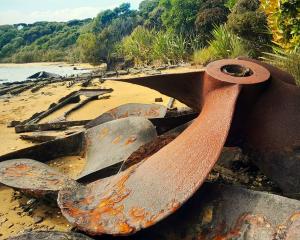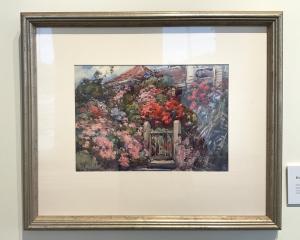
After visiting one of Dunedin's well known historic homes, Lisa Scott finds herself hankering for more genteel world.

Have you ever been to Olveston? I went once, when I was 13 and my grandparents were visiting from Greymouth, but couldn't remember much about it. I would have been checking my spots in the family silver and sighing a lot. The economist hadn't been, ever. I'm sure I don't have to explain why.
The former residence of David Theomin, an entrepreneurial, jovial man who believed the rich had a duty to both the less fortunate and the community they lived in (bumping into a stony-broke Francis Hodgkins in Tangier, he subbed her a boat ticket home and thereafter became her patron); the white-iced gingerbread mansion with its heraldic stained-glass windows was built in 1906 and represents a way of life for a successful few during the first century of New Zealand as a nation.
Unique in displaying the cluttered charm of an Edwardian country house, and built with every modern convenience at a time when the nightsoil men still whistled for your poo, it was left to the Dunedin City Council by daughter Dorothy in 1966. "Umm ... thanks?'' they said. Being in the midst of a Brutalism boom at the time, Moana Pool an example, the house wasn't ugly enough to initially be of interest! Luckily someone saw sense.
Can you imagine bequeathing your own abode for future generations to judge your taste in furniture, ferret through your kitchen drawers and laugh at all the instruction manuals for devices long broken? The horror! I won't even go into the economist's problem hoarding (3-D glasses, old bits of rope), as he's about to enjoy a special birthday and I'm trying to be nice to him.
The house (Olveston that is, our house is a snapshot of violence in the assembly of flat-pack furniture and the all-encompassing benefits of Superglue) is an extraordinary snapshot, time saved in bottle, everything left exactly as it was, from the kitchen's Dresden tiles to the Wedgwood and Meissen, as well as fabulous souvenirs from the Theomins' Grand Tour (a kind of continental furnishings pick and mix for the posh, involving reproduction Roman statuary and the odd Egyptian mummy).
Now one of the city's most popular attractions, tourists flock to admire the first editions in the library, the block-printed hessian walls, the Japonaiserie, the Goldie. A team of cleaners endlessly dust and polish, watch for moths and silverfish, maintain the house to art gallery standards and replace the 490-plus light bulbs.
Manager Jeremy Smith took us for a tour. "Bit small for mine,'' said the economist, whose motto is definitely not 'let everything be done shipshape and Bristol fashion'. "And all this antique furniture looks a tad uncomfortable. Have you thought of beanbags?'' Jeremy gave this suggestion the attention it deserved.
Thanks to his attention to good ideas, though, there is much happening these days at Olveston: yoga, painting classes, chamber music and croquet on the lawn; those who might otherwise never visit take in the splendid garden. The neighbourhood has changed somewhat in 100 years, from doctors and high-class prostitutes to naked students sunbathing on the rooftops of the houses nearby (well, maybe not), one cheeky sod even using the grand old house as a poste restante for parental mail. First-years venture up the driveway around June, curiosity having gotten the better of them and finding themselves sober, to ask: "What IS this?''
What it is, petal, is a reminder that Dunedin was once the capital of New Zealand, a bustling harbour town where the peak of all that was new and brilliant in engineering, science and architecture met over port and oysters. It was a city where a piss-up could be organised in a brewery, where the bold and brave came to make their fortunes and follow the wealth gold had brought.
OK, so the past wasn't fabulous for everyone (it especially sucked to be Chinese or a woman), but up in Dorothea's beautiful blue suite of rooms, I spent some time pretending. That I had staff, and didn't live in a world where people can't even go out dancing without some nutter gunning them down. The Theomins wouldn't recognise the awful world we now live in, a world where mass shootings are the norm and the rich feel no obligation to help the poor. And that is why it's so nice to spend some time in theirs.











